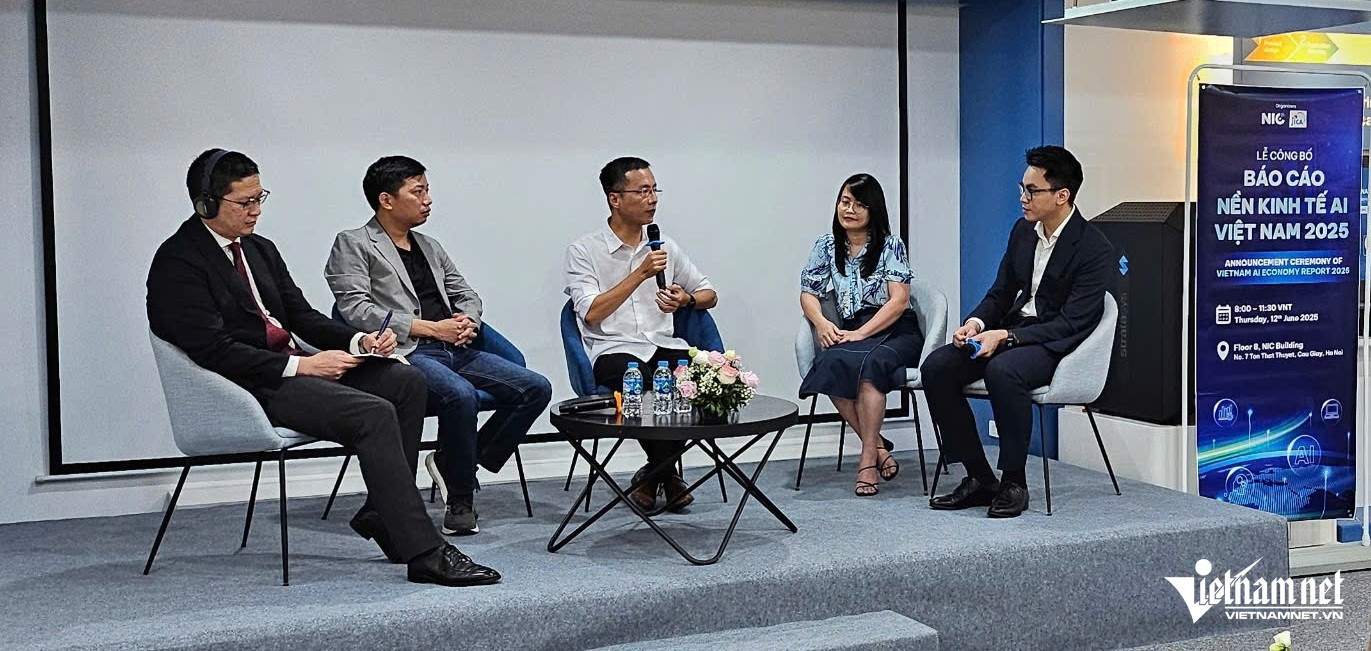
Le, Director of the International AI Research Center under the Hanoi University of Science and Technology (HUST), was present at the launch of the Vietnam AI Economy Report 2025 on June 12.
The report showed that Vietnam is in the early stages of AI development but progressing rapidly with participation from all stakeholders, including the government and private sector.
AI cannot be superficial when solving Vietnam's problems
At the event, experts from the Japan International Cooperation Agency (JICA), businesses, and educational organizations agreed that the greatest opportunity from AI lies in solving complex problems. These can range from personalizing e-commerce user experiences to training and policy planning.
However, Le noted that mastering technology is more critical than merely providing solutions. "Does Vietnam have companies that truly understand AI technology deeply and address Vietnamese-specific challenges?"
She believes that companies aiming to work with AI should focus on Vietnam's unique challenges and invest heavily in resources and in-depth research, avoiding superficial efforts.
"The AI wave can change businesses' mindsets; they cannot just create shallow products but must invest more in intellectual property," she added.
Nagano Yushi, Director of JICA Xlab, pointed out that when it comes to AI technology and applications, research and development (R&D) remains the core issue. Instead of superficial work, businesses should dive deep into AI research. This is an area where Vietnam and Japan can collaborate to advance AI development in Vietnam.
"To master technology, Vietnam has a significant advantage in its young, dynamic, and talented engineering workforce, highly regarded by foreign companies," said Nguyen Dang Huy, Chief Technology Officer of Sun Asterisk.
VN needs conductor to build “data lake"
Developing AI requires a combination of human resources, infrastructure and data. According to experts, Vietnam has abundant human resources ready for AI and fast-paced infrastructure, but it lacks data.
Nagano said that data is the foundation of the AI era, and a data exchange framework is needed for parties to optimize and exploit it.
However, creating a “data lake” is not simple, especially when businesses don’t want to share their databases with each other.
According to Le, to create a large database, there should be a leading unit or group to encourage everyone to follow.
“The data lake must be a government project to have enough power to call for support and cooperation,” she said.
Citing examples of several countries building AI development frameworks, Nagano recommended starting with businesses and non-sensitive, non-personal, anonymized data in industries with existing robust datasets.
He believes that under the Vietnamese government's leadership, stakeholders can achieve this.
Nguyen Hoang Hung, CTO of Viettel AI, argued that, to have more data, beyond government programs, there need to be leading products.
Major AI players like Google, Meta, and Naver hold vast data and have developed AI successfully. He predicted that nationwide digital transformation programs would generate similar data volumes.
He noted that AI development trends require laws and regulations to balance innovation and risk mitigation, creating a framework for businesses to develop products while preventing illegal activities like data trading.
Le said that "Vietnamese people are overly optimistic" about using and trusting AI without verification, unlike the cautious approach of other countries, which could lead to significant risks.
From a policymaker’s perspective, Nagano suggested Vietnam adopt a "soft" approach, as Japan did, rather than a "hard" one that creates barriers stifling business creativity.
This involves applying international standards to the national context to build guidelines for responsible AI use. This way, Vietnam's AI can not only serve domestically but also compete in the global market.
Vu Quoc Huy, Director of the National Innovation Center (NIC), emphasized that Vietnam is entering a critical transformation phase as the 4.0 Industrial Revolution reshapes global value chains, with AI as a key strategic technology.
According to Huy, AI could contribute up to $5 trillion to the global economy by 2030, and Vietnam must seize this historic opportunity to establish a strong position in the field.
Arnaud Ginolin, Managing Director of BCG Vietnam, said that the report provides a practical roadmap for Vietnam to advance digital transformation through AI. He stated that, if properly harnessed, AI could contribute $120 billion to Vietnam’s economy by 2040.
Du Lam